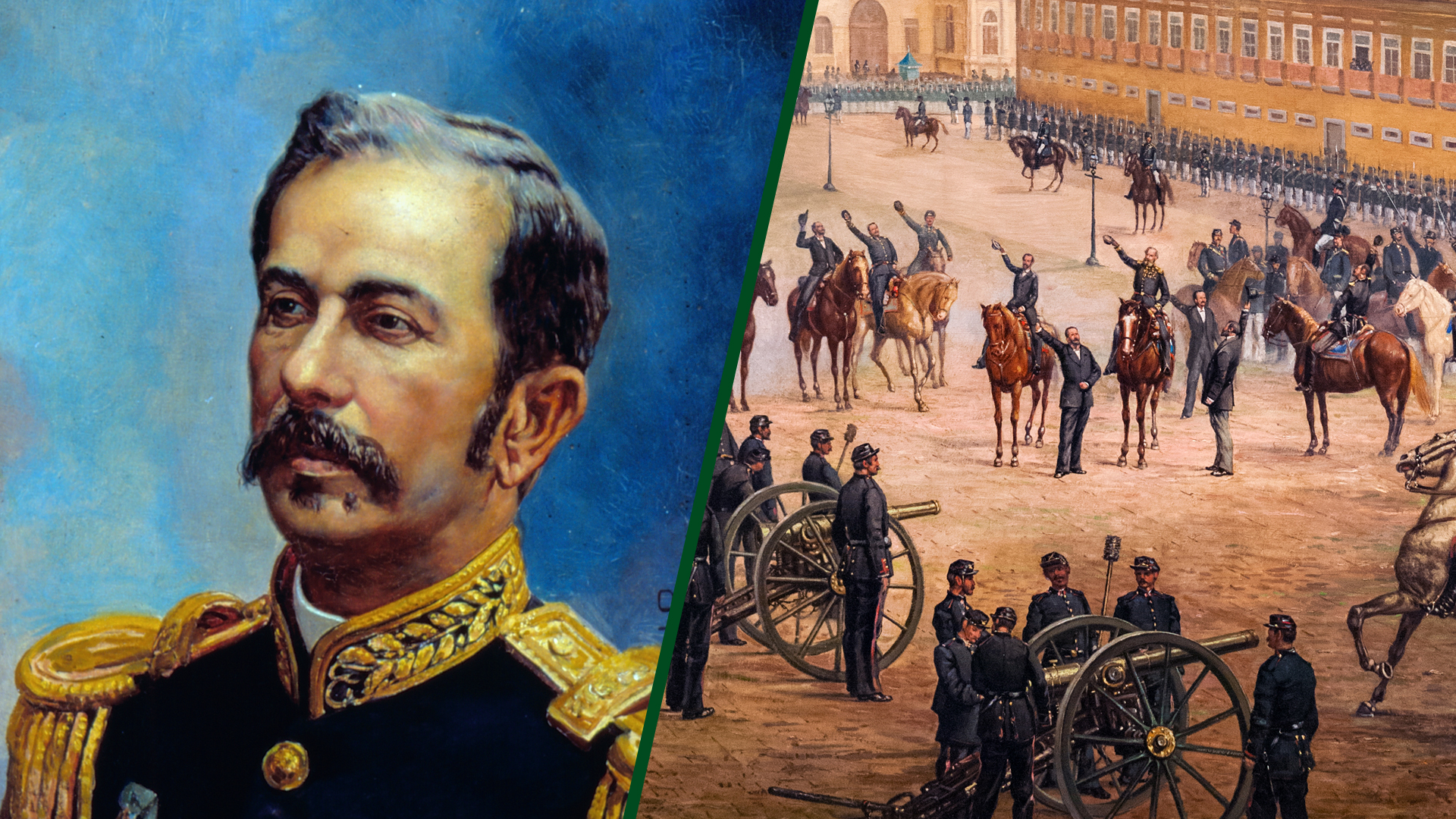The last cabinet of the Brazilian Empire appointed Floriano Peixoto (1839-1895), a distinguished soldier and veteran of the Paraguayan War, to the position of army adjutant-general. He was originally from Alagoas and had a strong association with the Liberal Party. Like Deodoro, he had participated extensively in the campaign against Lopez. He returned as a lieutenant colonel.

He was absent from both the Court and the barracks during the events of the “military question.” He embarked for the Court on the last ship of November 1888 but only reported for duty on January 31, 1889. On June 10, he was appointed to temporarily hold the position of adjutant-general and the following month, he was promoted to the rank of field marshal. Returning to the ranks after a long absence, he was received like a prodigal son. Visconde de Ouro Preto and Visconde de Maracaju placed their full confidence in Floriano Peixoto. However, the new field marshal was already a skeptic of the monarchy. Floriano had secretly been a republican since 1871 and had long been a supporter of the end of the monarchical regime.
Floriano Peixoto wrote from Alagoas to one of his friends, Lieutenant Colonel João Neiva de Figueiredo: “I saw the resolution of the class issue, which undoubtedly exceeded everyone’s expectations. A unique fact that vividly proves the rot in this poor country and therefore the need for military dictatorship to cleanse it. As a liberal, I cannot desire sword government for my country; but there is no one who does not recognize, and there are the examples, that it is the one that knows how to purify the blood of the social body, which, like ours, is corrupted.”
Floriano was an active participant in the Republic coup, refusing to lead imperial resistance against Deodoro da Fonseca’s coup, his long-time friend, whom he called “Manuel.” He reassured the Ouro Preto Cabinet that there were no suspicions of a coup conspiracy in the barracks, essential for the element of surprise on the fateful day.

In the provisional government, he rose to the highest position in the Brazilian Army in 1890 and became Minister of War in the same year. On November 15, 1889, while observing Deodoro da Fonseca’s troops, the last minister of the Brazilian Empire, Visconde de Ouro Preto, told Floriano Peixoto: “You spoke very appropriately about the Paraguayan War. I know that there you were valiant and handled cannons! Do the same, handling those that are there …”
Floriano replied – “The cannons of Paraguay were the enemy … Those that Your Excellency is seeing are Brazilian. And first of all, I am a soldier of the nation. The badges on my sleeves were earned on the battlefields, not for services rendered to ministers …”.
From simple passive resistance, Floriano gradually transitioned to a hostile attitude towards the ministry. The authority of Ouro Preto was merely nominal. No one obeyed the old statesman. After becoming the “Iron Marshal” and Consolidator of the Republic, Floriano Peixoto tried to justify the accusations of “Monarchy Traitor.” Despite being a trusted person of Ouro Preto, he favored the cause of the republicans, which he realized would emerge victorious if Deodoro succeeded in his coup. This attitude was explained by his well-known republican sentiments.
It is worth mentioning an article that Salvador de Mendonça wrote in 1913 in the newspaper “O Imparcial” from Rio de Janeiro, stating that the future “Iron Marshal” had been one of the signatories of a secret document drafted in 1871, showing adherence to the Republican Party. This fact would be implicitly confirmed by Quintino Bocaiúva when referring to Floriano, saying that “our affinity goes way back.”

According to historian Heitor Lyra, accusing Floriano of treason for not forcing the government forces to defend the ministry also does not seem justified, as the same accusation could be made against the commanders of those forces, starting with General Almeida Barreto, who commanded the Mixed Brigade, General Barão do Rio Apa, brother of the Minister of War, who commanded the 1st Brigade, and in the background, the commanders of the auxiliary corps – Police and Firefighters of the Court, Navy, Police of the Province of Rio (a force considered loyal to the brother of Ouro Preto, president of that Province), in short, “all those who wore uniforms and sided with the Republic,” as one of them, then Major and later deputy Oliveira Valadão (including himself), said, “since they had sworn to defend the monarchical regime adopted in the Constitution of the Empire.”
Floriano’s presidency was marked by numerous internal conflicts in Brazil, such as the Federalist Revolution and the Naval Revolt. During his presidency, his supporters created a political movement of positivist orientation called “Florianismo,” where Floriano defended his government as if the survival of the Republic depended solely on him. He then launched a dictatorship of national salvation. His government was nationalist and centralizing in orientation.
He was the first president of Brazil to have his image associated with Political Messianism. Many of his supporters were members of the Jacobin movement, who expressed their admiration for the president in newspapers and on the streets. For them, Floriano was the “Savior of the Republic.” The harsh repression imposed on the rebels led to Floriano becoming known as the “Iron Marshal.”
Reference: LYRA, Heitor. História da queda do império. Brazil: Brasiliana, 1964.

Matheus Araújo
Matheus Araújo is the founder and editor of Brazilian History. Born in Rio de Janeiro and holding a degree in Advertising and Marketing, his passion for history led him to enroll at the Federal University of the State of Rio de Janeiro, where he is currently pursuing a degree in History Education.
